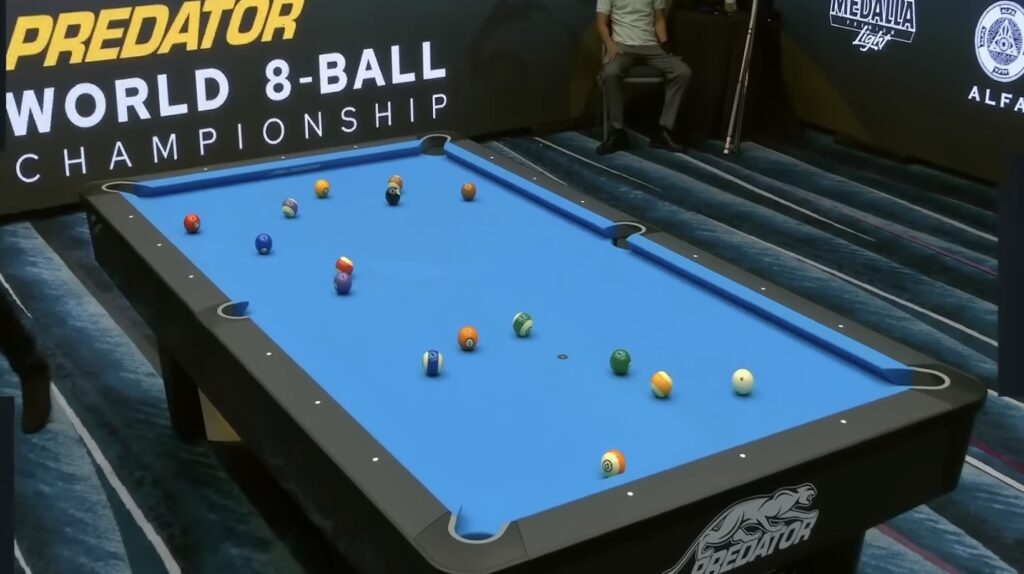
Understanding Pool Game Rules
Let’s dive into the world of pool and take a close look at its rules. A good grasp of these regulations will not only boost your performance but also make the game more enjoyable.
Firstly, it’s important to know that pool, also known as pocket billiards, has several variations with different sets of rules. Yet some common principles apply universally. For instance, players must always hit their assigned ball first during their turn. If you’re shooting solids and accidentally hit a stripe first, it’s considered a foul.
Shooting your ball and your opponent’s ball in one shot is a scenario that often puzzles many players. So what happens then? The answer depends on which ball was struck first. If you hit your own ball before hitting your opponent’s ball, the shot is legal as long as no other foul occurred (like scratching). However, if you strike your opponent’s ball prior to contacting yours, it would be declared a foul.
Another critical rule revolves around pocketing the 8-ball (or black). This should be done only after all of one player’s group of balls are out of play and must be called specifically into an intended pocket.
- Striking another player’s balls before yours: Foul
- Hitting both yours and opponents’ balls in one shot: Legal if yours was struck first
Understanding these nuances can drastically improve how we navigate our shots and strategize our games. Remember though – each variation of pool might have additional or differing rules. It’s always best to familiarize yourself with them before picking up that cue stick!
If you’re serious about getting better at pool, knowing the rules is key. It helps you play better whether you’re just practicing or in a competition. Also, having good gear really helps. Getting your equipment from a reliable place like Triangle Billiards can make a big difference. They have all kinds of pool tables, cues, and other stuff to help you play your best.
If You Hit Your Ball and Opponent’s Ball in Pool
In the world of billiards, accuracy is paramount. But let’s face it, not every shot goes as planned. Now and then, we’ll accidentally hit our opponent’s ball instead of the intended target. It’s a common misstep that can alter the direction of a game.
The first consequence we might encounter is a foul penalty. Most pool games like 8-ball or 9-ball have specific rules regarding fouls. In 8-ball, for example, hitting your opponent’s ball before one of your own results in a foul. This generally means we forfeit our turn to our opponent.
Aside from losing our turn, there are often additional penalties that come with fouling in pool games. For instance:
- Our opponent may get free placement or ‘ball-in-hand’ rights.
- We could lose points depending on the format of play.
- The opposing player might be allowed to take an additional shot.
These penalties can drastically shift the momentum towards our opponents and increase their chances for victory.
The long-term consequences also deserve attention. Repeatedly hitting an opponent’s ball out-of-turn could lead us down a path where we’re seen as less skilled players. It might even limit opportunities to participate in more competitive levels if individuals or teams perceive us as unreliable players.
Does ‘Ball-in-Hand’ Rule Apply
Let’s delve into the ‘ball-in-hand’ rule. This rule is invoked when you commit a foul during your turn in pool. So, say you’ve accidentally hit your opponent’s ball along with yours, does this mean it’s time for the ‘ball-in-hand’ rule? Absolutely!
In most versions of pool, hitting an opponent’s ball before striking your own amounts to a foul. It doesn’t matter if it was intentional or purely accidental. This situation results in the other player getting a ‘ball-in-hand’. They’re then free to place the cue ball anywhere on the table before their shot.
The beauty of this rule lies in its ability to keep games fair and balanced. Every player gets an equal opportunity to make their move without being put at a disadvantage because of unintentional mishaps. So next time you’re lining up that tricky shot remember – don’t just go for glory! Remember these key points:
- The ‘ball-in-hand’ rule applies when you hit your opponent’s ball before your own.
- In case this happens, your opponent gets to place the cue-ball wherever they want before shooting.
- Fouls play a significant role in determining the outcome of pool games.
While we might think we have full control over our shots, sometimes things don’t pan out the way we expect. So, it’s always important to understand the rules thoroughly and play strategically!

 By
By 





